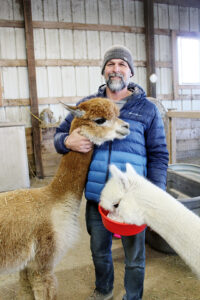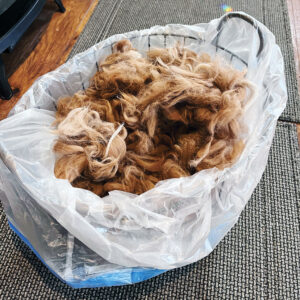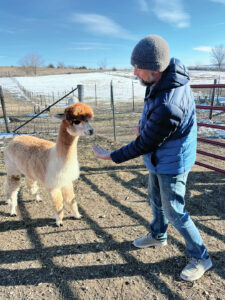Visit 37 alpacas, free of charge
3/6/2024
Aron Shultz feeds his alpacas.
When offered a handful of grain, Stella, an alpaca, sticks out her long tongue to scoop the food into her mouth, leaving slobbery drops on the offering hand. Within minutes, more alpacas arrive with hopes to gobble up a special treat.
The alpacas are part of the Rusty Stars Alpacas herd, owned by Aron and Kari Shultz.
When the Shultzes lived in Colorado 16 years ago, they purchased three alpacas. Their original plan was to grow a herd and sell them, as was popular to do in Colorado. However, an economic crash hit, and they rethought their plans for the alpacas.
In 2012, they, along with the alpacas, moved to Iowa.
“In Colorado, there’s lots of interest. In Iowa, alpacas are little known. We wanted to educate people so they can learn more and visit the alpacas,” says Aron.
Currently, Aron has 37 alpacas at their farm near Winterset. The public can visit the alpacas free of charge. During the COVID pandemic, people searched for outdoor activities, and the place surged in popularity. Numerous school, 4-H groups and people of all ages now visit, pet or handfeed the alpacas. Aron’s decision not to charge admission was key.
“Some people have never had an opportunity to visit an alpaca. People appreciate that there is no fee,” he explains.

Alpaca fleece is considered superior to other animal wool or fiber.
The Shultzes opened a store with items made from alpaca fleece, which is considered superior to other animal wool or fiber. Petting a baby alpaca feels like sinking your hand into a soft, teddy bear-like plushness.
Alpacas are sheared once a year.
“Their softness is warmer than wool, and it’s hypoallergenic,” Aron says.
The yarn sold in the store is from the alpacas in the Rusty Stars herd.
“People hang out with the alpacas and purchase their yarn as a souvenir,” says Aron. “People like that it is traceable to the animal outside.”
Eight of the alpacas were featured at the Blank Park Zoo last summer. One was showcased on a billboard in Des Moines.
Alpacas are considered herd animals or livestock.
“We often refer to them as pet-like, but not pets in a legal classification. They’re not exotic, but they are domesticated,” he explains.
Some alpacas are friendlier than others.

Aron Shultz feeds his alpacas.
“They know me but don’t respond like a cat or dog,” he says. “The alpacas recognize me as someone who gives them food.”
He says it’s a myth that alpacas spit.
“A llama might do that, but it’s rare for alpacas to spit. If they do, it’s because they’re arguing over food with another alpaca.”
Alpacas live about 20 years, and Aron’s goal is to keep the animals their entire life.
One unique thing about alpacas is they don’t usually lay down to sleep.
“They go into a relaxed state. They are usually gentle, friendly and curious.”
Aron likes how he can interact with the alpacas daily and feels a sense of bliss when he’s with them.
“Getting to do what I love — I can pursue my passion. Animals are a big part of it,” he reflects. n


















